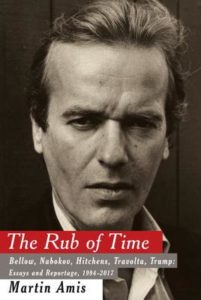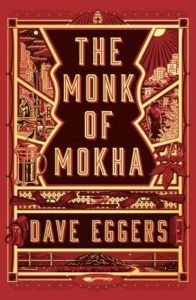
Anne Enright thinks Martin Amis is the perfect person to write about the porn industry, James Wood and Ali Smith both love puns (maybe a little too much), Parul Sehgal reads Dave Eggers’ narrative nonfiction with equal parts admiration and suspicion, and more.
*

“Denis Johnson, in all his work, aimed to locate the hidden, actual face of things. But the new stories build without those miraculous balls of hail, and their truths are necessarily deeper, and more precise, true as you would true a wheel … It feels like the paced vision of a writer who has been made to understand that life is fairly rude and somewhat short, but that the world contains an uneven distribution of grace, and that wisdom lies in recognizing where it—such grace—has presented itself. The stories are about death and immortality, art and its reach, and they ask elemental questions about fiction, not as a literary genre but as a human tendency … These stories ask you to step into the room and listen closely. They are not showy anthems, and in many cases, they have dispensed with hindsight altogether.”
-Rachel Kushner on Denis Johnson’s The Largesse of the Sea Maiden (Bookforum)
*

“The Rub of Time is Amis at his considered best, witty, erudite and unafraid. You can sit and be like Martin Amis all day, wondering how he could be so right about the Republican party in 2011, so prescient about Trump as early as May 2016. The hierarchy thing, that need to revere older writers, may be a little bit male for some, but male is the way that Amis rolls, which makes him one of the best people on the planet to write about the porn industry (a chivalrous piece, as it happens). He is sweetly sentimental when it comes to the British royal family (why?), funny about tennis, always brilliant about the body, scorching in his refusal of death, its sorrows and humiliations … Amis is always begging for interruption and fending it off at the same time, busking his way to the best bit, fighting with shadows to snatch the prize … Amis is fantastic company until he isn’t. The drop can sometimes be severe, though never so steep as with his friend Christopher Hitchens, another writer who makes the reader feel smart, energised, enlarged, or does until he says something stupid in a really clever way … I will, like many of his readers, grow old in a different direction. Still, this collection is full of treasures. And, if you want a good scrap, if you want to feel like Martin Amis while fighting with Martin Amis (which is possibly how he also spends his day), a couple of these pieces will keep you going for a long time.”
-Anne Enright on Martin Amis’ The Rub of Time (The Guardian)
*

“It’s narrative nonfiction that is his natural home. Telling other people’s stories seems to focus him. The sentences take on an Orwellian clarity — they’re lean and clean, flensed of the tics, doodles and strenuous self-consciousness of his early work, and of the dour didacticism of the new novels. In The Monk of Mokha, he moves lightly between story and analysis, and between brisk histories of Yemeni immigration to America; gentrifying San Francisco; coffee cultivation; and the saints and thieves who dispersed the beans around the world … It left me warmed, but also wired, and a little twitchy. What is it about Eggers? What accounts for this aftertaste that is equal parts admiration and suspicion?…Eggers wants to humanize immigrants, but in his telling, something very different seems to occur. Everything about his characters is outsize — their bravery and suffering, their resilience and capacity for forgiveness, their contributions to the country. They are supermen, their powers ‘entrepreneurial zeal and dogged labor.’ Time was, to make a home in this country it was enough to yearn to breathe free.”
-Parul Sehgal on Dave Eggers’ The Monk of Mokha (The New York Times)
*
“…for all the sense of bitter urgency, her work remains essentially sunny (pun-drenched, pun-kissed). Autumn and Winter, novels full of political foreboding, are also brief and almost breezy—topical, sweet-natured, something fun to be inside … Smith’s capacious art warmly embraces variety, and creates eccentric stylistic families out of disparate inheritances … Winter lacks the cohesion of Autumn. It’s an antic collage, with a daub or two that might usefully have been suppressed. Like a number of Smith’s novels, it doesn’t know when to end—usually an element of her joyful profligacy—and trundles along into silliness … This sort of bonhomous playfulness won’t delight everyone. It’s not always to my taste. The cost of inhabiting a world of postmodern Shakespearean comedy is precisely that life is seen buoyantly but not very tragically. The neatness of the pun, its capacity to make things rhyme, exists at the expense, perhaps, of mess, despair, and sheer human intractability. Yet there is also something beautiful about art as play, about witnessing jokes and figures of speech and clichés and stray words shimmer into reality—seeing them become things, become central to a book’s machinery—and then slip away again into gauzy abstraction.”
-James Wood on Ali Smith’s Winter (The New Yorker)
*

“Rather than a genre mash-up, this is a genre car crash: kinetic, explosive, and uproariously messy. That mad energy is infectious … Smith’s gifts of imagination are staggering. Her world-building is a tangled sprawl of past, present, and future, a wickedly satirical synthesis that underlines just how fractured our own realities can be during periods of fear, unrest, inequality, and instability. But she does far more than hold up a cracked mirror to our world. In language that punches and caresses, she dwells on ugliness and beauty in equal measure … The Sky Is Yours filters youth through a warped yet poignantly canny speculative-fiction lens. At the same time, it’s funny as hell, full of madcap detail, firecracker dialogue, and a healthy dose of absurdism in the face of darkness.”
-Jason Heller on Chandler Klang Smith’s The Sky is Yours (NPR)

